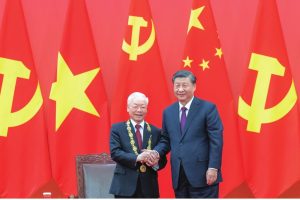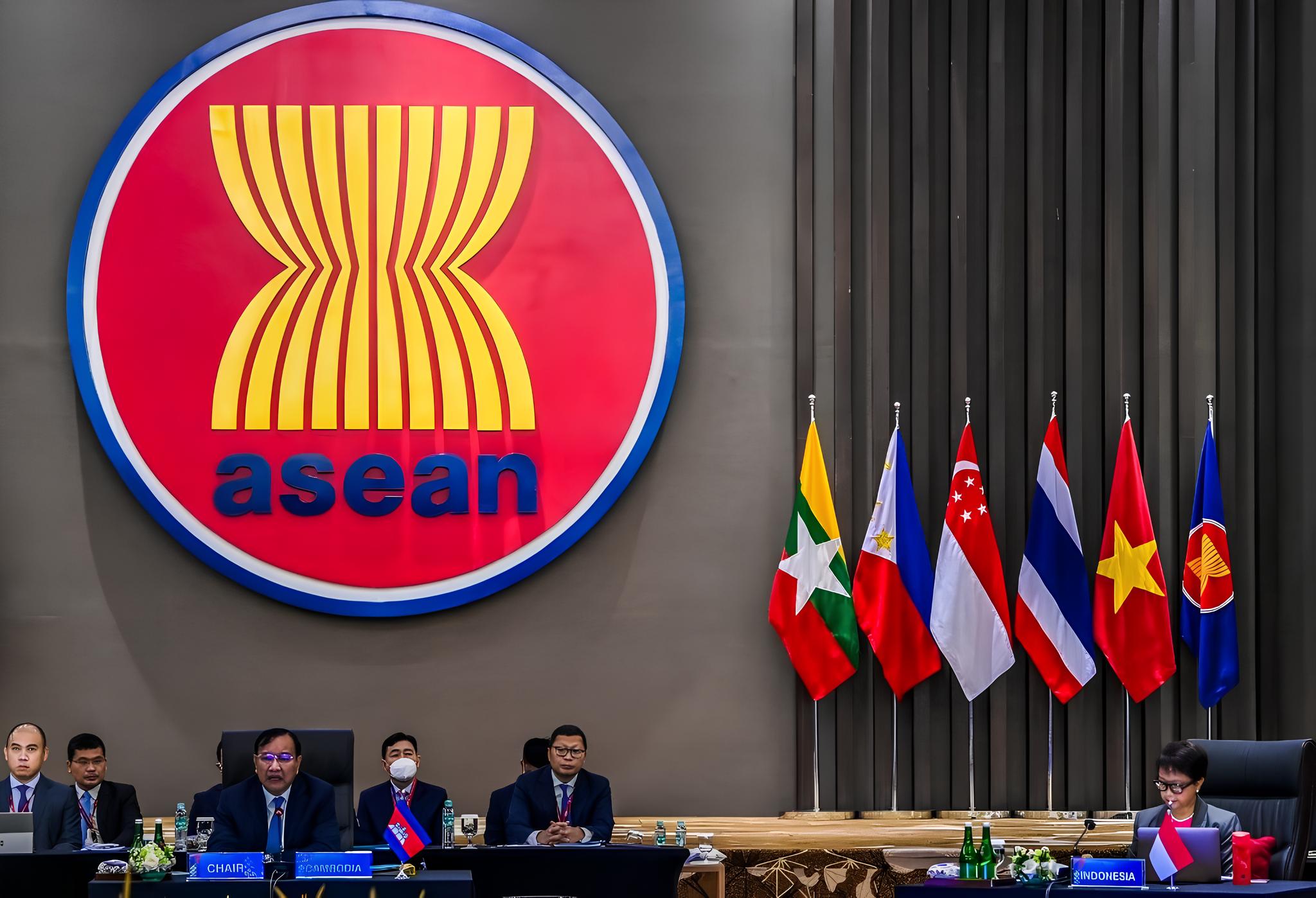
A concise and thorough summary of the first-ever ASEAN-GCC Summit held in Riyadh.
October 18, 2023

On the 20 th of October, head of states and representatives from the ten constituent nations of the Association of Southeast Asian Nations (ASEAN) and the six sovereign entities comprising the Gulf Cooperation Council (GCC), are scheduled to convene within the capital city of Saudi Arabia, Riyadh, for the inaugural ASEAN-GCC summit. This gathering, ascertaining a specific focus on the domains of economic and energy collaboration, transpires during a notably consequential period, marked by the discernible proclivity of Gulf nations to expand their diplomatic entanglements beyond the conventional Western allies, thus reflecting an integral facet of their overarching strategy designed to catalyse South-South cooperation.
The summit is juxtaposed with a broader geopolitical context wherein the Asian region assumes an increasingly pronounced and influential stance within the Middle East arena. This transition is underscored most notably by the recent accord brokered by the People’s Republic of China, sealing a pact between the Kingdom of Saudi Arabia and the Islamic Republic of Iran, where the two countries agreed to resume diplomatic relations.
Among the ASEAN members, Malaysia, has already taken proactive measures to intensify its collaborative engagements with the GCC member states, principally centered around economic investments and trade initiatives. This is perhaps most conspicuously evidenced by Prime Minister Anwar Ibrahim’s visit to the United Arab Emirates (UAE), wherein substantial commitments to the tune of $8.6 billion were pledged for investments, targeting sectors such as renewable energy by Abu Dhabi into Malaysia.
The Malaysia-GCC relationship is characterized by shared cultural and religious affinities, and possesses the inherent capacity to serve as a potential conduit or intermediary, facilitating enhanced interaction with the GCC. This role, akin to that of a bridge, emerges as a distinct possibility, underpinning Malaysia’s unique position within the broader framework of multilateral and regional diplomacy.
Geopolitical Dynamics
The summit is conveyed amidst a pivotal juncture wherein the GCC member states, notably regional powers such as Saudi Arabia, are in the throes of an reconfiguration of their foreign policy landscape. This recalibration is characterized by a concerted effort to diversify their spectrum of bilateral and multilateral partnerships, with a special focus on South-South cooperation initiatives. This overarching transformation is ostensibly guided by the ambitious Saudi Vision 2030, championed by the Crown Prince of Saudi Arabia, Mohammed Bin Salman. This ambitious roadmap seeks the diversification of economic revenue streams, thereby necessitating the expansion of bilateral and multilateral partnerships.
Within this intricate context, ASEAN emerges as a model, distinguished as a regional organization steadfastly adhering to the principle of non-interference in the internal affairs of its member states. A salient feature of ASEAN is its membership, comprising countries with shared cultural affinities and connections, yet characterized by a tapestry of diverse political governance structures and foreign policy approaches. Despite these apparent disparities, ASEAN has adeptly navigated the nuanced terrain of great power competition, most notably between the United States and China, deftly implementing a strategic hedging approach to safeguard its interests and maintain regional stability.
Prominently featured on the summit’s agendawill be the imperative of bolstering economic collaboration, with a specific emphasis on enhancing trade activities and fostering an intensified partnership within the energy sector. A development preceding this summit is the formal accession of Kuwait, marking all six GCC members as official signatories to the ASEAN Peace Pact, commonly referred to as the Treaty of Amity and Cooperation (TAC).
TAC constitutes a pivotal diplomatic instrument that underscores the commitment of signatory nations to uphold principles of non-interference, respect for sovereignty, and peaceful conflict resolution. The GCC, with Kuwait’s accession, joins a noteworthy assembly of nations adhering to the TAC, further reinforcing its commitment to fostering regional stability and cooperation. This development is expected to have significant implications for trade relations between GCC and ASEAN countries, facilitating a more structured and conducive environment for trade activities and economic collaboration.
Bridging Nations and Regions:
Malaysia’s Pivotal Role in GCC-ASEAN Cooperation Among the ten ASEAN member states, it is evident that the two most crucial and enduring bilateral partners for GCC member states, particularly regional powerhouses like Saudi Arabia, are the Muslim-majority nations of Malaysia and Indonesia. This prominence is rooted in long standing religious, and cultural affinities that have evolved over centuries, further reinforced by diasporic connections and familial networks. These strong connections find expression not only in bilateral interactions but also within the framework of multilateral partnerships facilitated through the Jeddah based Organization of Islamic Cooperation (OIC).
This profound partnership with the GCC was conspicuously underscored during the preparatory negotiations for the upcoming summit. Media reports revealed that both Indonesia and Malaysia expressed a strong willingness to host the summit, an expression of their commitment to the regional cooperation between the GCC and ASEAN. Although, for various logistical reasons, the opportunity to host the summit did not come to fruition for either nation, this itself reflects the high regard in which these countries are held as potential bridges between the two regional groupings, positioning them as pivotal conduits in the
dynamic interplay of these two important regional organizations.
Malaysia’s partnerships with the GCC nations, transcends conventional domains such as trade, energy, and investments that will dominate the summit’s agenda, and extends into areas of strategic importance. Notably, over the past few years, Malaysia has witnessed a substantial upswing in defense relations with GCC member states, exemplified by its military support for the Saudi-led coalition during the conflict in Yemen, despite facing criticism from certain segments of its own domestic opposition and media. Malaysia contributed both political and military support to the coalition by providing personnel and equipment to Riyadh, particularly for humanitarian and evacuation operations. In 2022, Malaysia and Saudi Arabia solidified their military collaboration through a five-year agreement, structured around three core elements: military cooperation, defense industry partnership, and the support of veteran soldiers.
A recent highlight in this burgeoning defense relationship was the joint military exercise between Malaysia and the UAE, dubbed as ”Desert Tiger 6.” This exercise witnessed the esteemed presence of UAE President Sheikh Mohamed bin Zayed Al-Nahyan and the Malaysian Monarch Al-Sultan Abdullah Sultan Ahmed. The Malaysian media has attributed the close personal friendship between these two royal figures as a significant driving force behind the burgeoning bilateral partnerships, underscoring the multifaceted nature of Malaysia’s role within the GCC-ASEAN context, one that transcends economic interests and delves into the strategic realms of international diplomacy and security cooperation.
In conclusion, the largely low-key relationship between the GCC and ASEAN, has long been characterized by untapped potential, waiting to be fully realized. This potential has often been hindered by a complex web of geopolitical considerations and regional dynamics that have shaped diplomatic engagement. However, the forthcoming summit heralds a unique opportunity to transform this latent potential into a dynamic, thriving partnership that spans a broad spectrum of economic, diplomatic, and strategic arenas.
The significance of this summit cannot be overstated. It has the potential to open doors to a realm of cooperation that knows no bounds. From energy collaboration to trade agreements, from cultural exchange, tourism to defense partnerships, the possibilities are endless.
Nonetheless, the path forward demands consistency, coordination, and coherence in the pursuit of common objectives. It is through steadfast commitment to shared goals, the harmonization of strategies, and a clear, collective vision that the GCC and ASEAN can navigate the intricate geopolitical terrain to unlock the boundless opportunities that lie ahead. With the right approach, this summit may well mark the commencement of a new era of collaboration and mutual benefit between two regions.
A curated seletion of FA’s must-read stories.
Written By: BUGRA NARIN
Written By: FURKAN ETIK
Written By: ALPEREN MOROVA
Written By: OMER FARUK KARA
Written By: E. ERDEN
Written By: SHOHREH POOLAB
Written By: ALEYNA TASTAN
Written By: CIHAN KAAN GAZI

Rizwan Rafi Togoo is a analyst and researcher specalizing in Middle Eastern Diplomacy and the geopolitics of Southeast Asia-Middle East interactions, focising on Malaysia and the Gulf Cooperation Council. He completed his Advanced Masters of Science in International Relations Diplomacy from Leiden University, which was jointly taught with the Netherlends Institute of International Relations,Clingendeal, located in The Hague.
Written By: ABDURRAHMAN ADIGUZEL
Written By: BEYZANUR SARICICEK
Written By: SELIN ARDIC
Written By: NILAY CELIK
Written By: ELDANIZ GUSSEINOV
Written By: JOSEF SCHOEFL
Written By: SINEM UNALDILAR
Written By: FATIH CEYLAN
FA’s flagship evening newsletter guilding you through the most important world streis ofthe day. Delivered weekdays.
